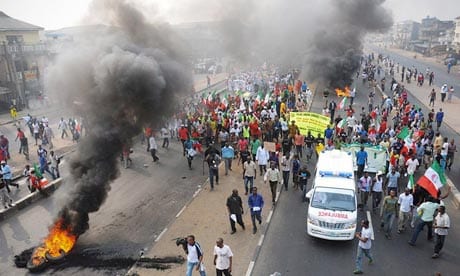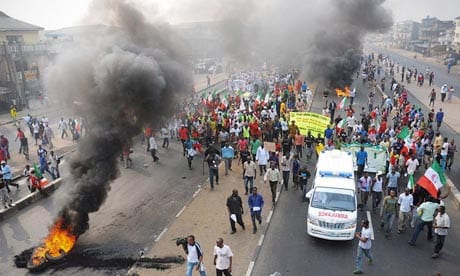
Nigeria‘s president announced that the government will subsidise fuel prices to immediately reduce the price to about $2.75 (£1.80) a gallon amid a nationwide strike over the removal of the oil subsidy.
President Goodluck Jonathan also claimed provocateurs have hijacked the protests and demonstrations, which have seen tens of thousands march in cities across the country. Jonathan offered no other details on his claim, but his address on the state-run Nigerian Television Authority showed how worried his government had become by the demonstrations.
“It has become clear to government and all well-meaning Nigerians that other interests beyond the implementation of the deregulation policy have hijacked the protest,” Jonathan said. “This has prevented an objective assessment and consideration of all the contending issues for which dialogue was initiated by government. These same interests seek to promote discord, anarchy, and insecurity to the detriment of public peace.”
Jonathan’s speech came after his attempt to negotiate with labour unions failed late on Sunday night to avert the strike entering a sixth day. The president of the Nigeria Labour Congress, Abdulwaheed Omar, said early on Monday morning he had ordered workers to stay at home over Jonathan’s fears about security, but that might not keep people away from attending mass demonstrations like one in which more than 20,000 people show up in the country’s commercial capital of Lagos.
The strike began on 9 January, paralysing the country of more than 160 million people. The root cause remains fuel prices: Jonathan’s government abandoned subsidies that kept prices low on 1 January, causing prices to spike from $1.70 a gallon (45 cents a litre) to at least $3.50 a gallon (94 cents a litre). The costs of food and transportation also largely doubled in a country where most people live on less than $2 a day.
Anger over losing one of the few benefits average Nigerians see from living in an oil-rich state led to demonstrations across the country and violence that has killed at least 10 people. Red Cross volunteers have treated more than 600 people injured in protests since the strike began, officials said.
Jonathan and other government officials have argued that removing the subsidies, which are estimated to cost $8bn a year, would allow the government to spend money on badly needed public projects across Nigeria, with its cratered roads, little electricity and a lack of clean drinking water for its inhabitants. However, many remain suspicious of government as military rulers and politicians have plundered government budgets since independence from Britain in 1960.
The strike also could cut into oil production in Nigeria, which produces about 2.4m barrels of crude a day and remains a top energy supplier to the US. A major oil workers association threatened on Thursday to stop all oil production in Nigeria at midnight on Saturday over the continued impasse in negotiations. However, the Nigeria Labour Congress said the association had held off on the threatened production halt.
Picture and story fromGuardian.co.uk.

